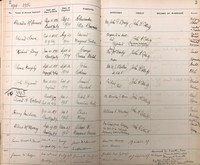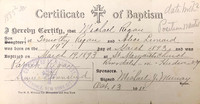

Described as a “monumental three-phase project,” the Archives of the Archdiocese of New York has launched a digital database of historical sacramental records dating back to the earliest documented Catholic baptisms and marriages in the archdiocese.
“We know that accessing the records of the Catholic Church in New York has long been a goal of those who study their family’s history,” Cardinal Dolan said in a March 2 letter to the archdiocesan faithful. “For the past several years, the archdiocese has been working with Find My Past, a family history company, to bring the historical sacramental records of the Archdiocese of New York online.”
The cardinal’s letter also notes that through Find My Past’s Catholic records portal, people from around the world now can explore their family’s New York Catholic heritage. When taken as a whole, the service also offers a snapshot into the changing world of 19th and early 20th century New York. Major themes, such as demographic changes, immigration, language and culture can all be explored through the record set.
Also of great importance is balancing this openness with a respect for the privacy of those whose lives are reflected in the records. That is why, the cardinal and others note, the archdiocese has instituted a 100-year privacy rule on all the records being released. Only those records created more than 100 years ago, before 1918, will be available for research. Moreover, users of the service may notice some redacted records throughout the collection. While the archdiocese tried to keep redactions to the bare minimum, the guiding principles were the law and a respect for privacy.
Kate Feighery, director of the Archives office in Yonkers, told CNY, “We’re coordinating the project between the parishes and the company. The final approval for the project came directly from (Cardinal Dolan) prior to the signing of the contact in 2016.”
Ms. Feighery noted that the project is beneficial because people “can access a centralized database of historical records—for people to have access to them and be able to look at them in one place instead of going to individual parishes; they can explore their connection to their heritage, and their connection to the Catholic faith. These parish records are kept handwritten on paper; there are no backup copies, so by making digital copies of them, we’re preserving them for the future. We have been concerned about preserving these records for a long time.”
Msgr. Robert Ritchie, rector of St. Patrick’s Cathedral, has used the digital database. “I was able to look up my grandparents, on my father’s side—they were married in 1912 at Holy Name on 96th Street (Manhattan),” he said, noting that the digital database is a great benefit for both families and researchers.
“It’s a great idea,” Msgr. Ritchie said. “They (Find My Past) were here a year or two ago; they took our books, took pictures of them and then returned them to us a few weeks later. They’re very efficient.”
The project is designed to preserve the historical legacy of records dating back to the decades following the American Revolution, while protecting the privacy of individuals whose life trajectories are documented in the records. The launching of the effort contains 8 million indexes ranging from 1785 to 1918, and subsequent records will be released annually to ensure that records published in the database are at least 100 years old, the office reported.
Ms. Feighery noted that some of the oldest parish records are very fragile, with torn pages and binders broken—and that some records were lost to fires before the 1900s. “Today, most of the records are kept in fireproof safes,” Ms. Feighery said, adding that her office receives an average 10 inquiries per week. The parishes, she noted, receive many other inquiries.
She said the British-based Find My Past company was selected for the project because of its successful record with other Catholic dioceses in the United States, the U.K., Ireland and Scotland, and because it demonstrated “respect for the religious aspect…I spoke with (archdiocesan) folks down in Philadelphia and everyone gave great feedback; people have been generally pleased.”
She said the company began similar archdiocesan digital database projects in Philadelphia last year, recently signed a contract in Cincinnati and will begin in Baltimore later this year.
The database information made available when the project was launched March 2 is from microfilm. As for the second phase of the project, Ms. Feighery said that later this year subscribers would also be able to access the same information from the scanning and digitizing of the actual sacramental ledgers—in color and with more detailed information, such as names of parents, godparents, addresses, parish priests and related annotations.
In the final phase, she said, “We’re going to be digitizing the Catholic News, which was the archdiocesan newspaper from 1886 to 1981. It was the official (weekly) newspaper of the archdiocese, but it was independently published by the Ridder family; they’re in Mamaroneck—they publish the Catholic Telephone Guide.”
That third and final phase is also expected to begin later this year; both phase two and phase three will probably be finished in 2020.
And for a bit of history, Ms. Feighery noted that the Archdiocese of Baltimore early on encompassed the entire country. The Diocese of New York broke off in 1808, as did the Diocese of Philadelphia; they both eventually became archdioceses (New York in 1850), with the Archdiocese of New York early on encompassing all of New York state and parts of northern New Jersey.
Find My Past subscribers can receive a 14-day free trial; after that, a subscription would be $19.95 per month, or $179 for 12 months. The information obtained will also include general data usually associated with genealogical research, as provided by Find My Past.
To access the database, follow the link: http://archnyarchives.org/genealogy/ Information: the Archives of the Archdiocese of New York, (914) 476-6333.